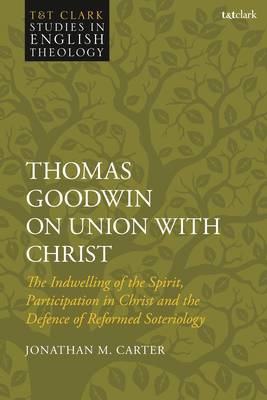
Bedankt voor het vertrouwen het afgelopen jaar! Om jou te bedanken bieden we GRATIS verzending (in België) aan op alles gedurende de hele maand januari.
- Afhalen na 1 uur in een winkel met voorraad
- In januari gratis thuislevering in België
- Ruim aanbod met 7 miljoen producten
Bedankt voor het vertrouwen het afgelopen jaar! Om jou te bedanken bieden we GRATIS verzending (in België) aan op alles gedurende de hele maand januari.
- Afhalen na 1 uur in een winkel met voorraad
- In januari gratis thuislevering in België
- Ruim aanbod met 7 miljoen producten
Zoeken
Thomas Goodwin on Union with Christ
The Indwelling of the Spirit, Participation in Christ and the Defence of Reformed Soteriology
Jonathan M Carter
€ 203,95
+ 407 punten
Uitvoering
Omschrijving
Thomas Goodwin has been described as 'the forgotten man of English theology' and, though known by some as a pioneer of congregationalism and a prominent member of the Westminster Assembly, the true significance and scope of his life's work has only recently been discovered. Historical reassessment has uncovered that the majority of Goodwin's treatises were intended to form a grand project defending Reformed soteriology in the 1650s against new threats as well as traditional opponents.
Examining Goodwin's notion of union with Christ in relation to mystical indwelling, transformation, justification and participation, this study demonstrates the central role of union with Christ in Goodwin's soteriology. The application of salvation, he contended, must be founded on 'real' union with Christ (i.e., mystical union forged by Christ's indwelling) in order to advance a trinitarian, federal, high Reformed soteriology in which redemption from sin is set within a Reformed scheme of Christocentric deification. This in-depth analysis makes a fresh contribution to recent controversy over union with Christ in the post-Reformation period.
Examining Goodwin's notion of union with Christ in relation to mystical indwelling, transformation, justification and participation, this study demonstrates the central role of union with Christ in Goodwin's soteriology. The application of salvation, he contended, must be founded on 'real' union with Christ (i.e., mystical union forged by Christ's indwelling) in order to advance a trinitarian, federal, high Reformed soteriology in which redemption from sin is set within a Reformed scheme of Christocentric deification. This in-depth analysis makes a fresh contribution to recent controversy over union with Christ in the post-Reformation period.
Specificaties
Betrokkenen
- Auteur(s):
- Uitgeverij:
Inhoud
- Aantal bladzijden:
- 288
- Taal:
- Engels
- Reeks:
Eigenschappen
- Productcode (EAN):
- 9780567704894
- Verschijningsdatum:
- 19/05/2022
- Uitvoering:
- Hardcover
- Formaat:
- Genaaid
- Afmetingen:
- 156 mm x 234 mm
- Gewicht:
- 576 g

Alleen bij Standaard Boekhandel
+ 407 punten op je klantenkaart van Standaard Boekhandel
Beoordelingen
We publiceren alleen reviews die voldoen aan de voorwaarden voor reviews. Bekijk onze voorwaarden voor reviews.









